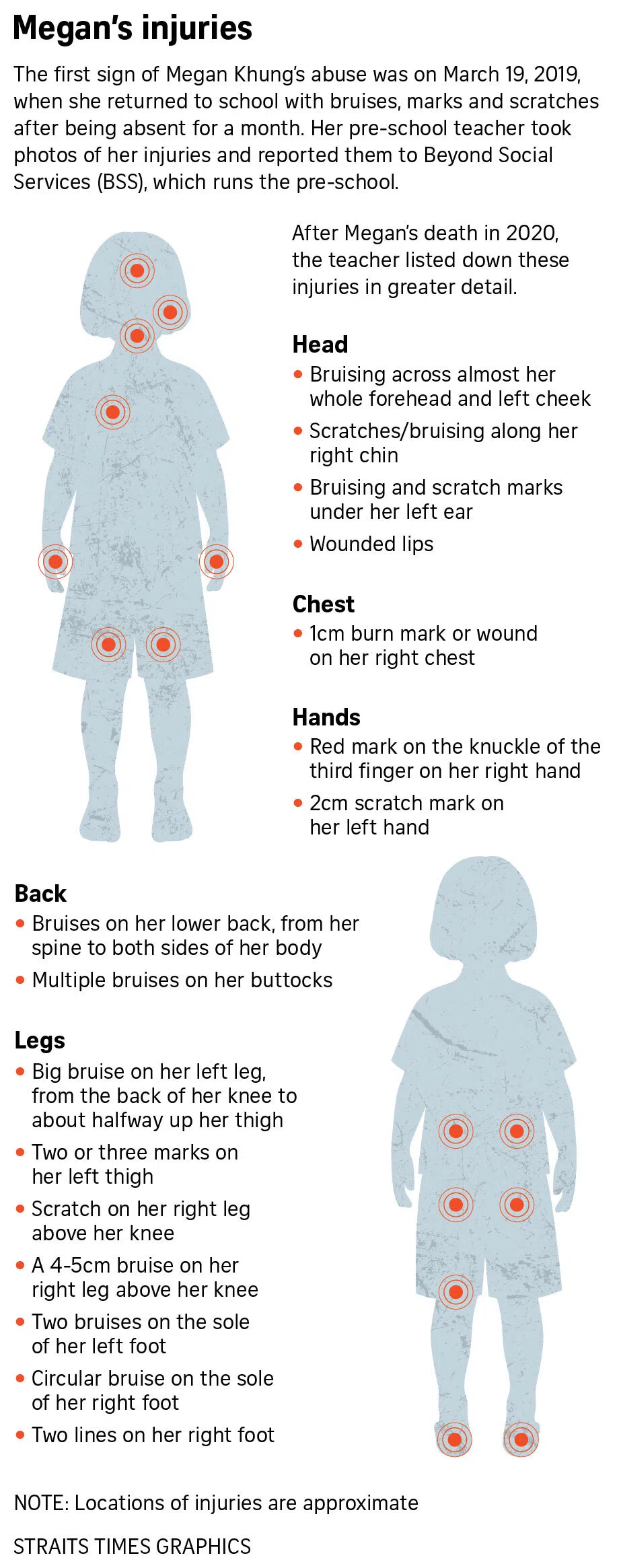- Joined
- Aug 20, 2022
- Messages
- 22,485
- Points
- 113
5 key findings from report on Megan Khung’s death: Lapses by police, Child Protective Service found
Published Oct 23, 2025, 04:31 PMUpdated Oct 23, 2025, 04:53 PM

Megan Khung died on Feb 22, 2020, after more than a year of horrific abuse by her mother and the woman’s boyfriend.
PHOTOS: SHIN MIN DAILY NEWS, LIANHE ZAOBAO FILE

Christine Tan
www.straitstimes.com

Appointed by Minister for Social and Family Development Masagos Zulkifli, the panel
released its report on Oct 23
, revealing lapses at multiple points across the system.
Megan was abused and humiliated from 2019 to 2020 by her mother Foo Li Ping, and the woman’s boyfriend Wong Shi Xiang. The girl
died in February 2020
. Her body was burnt and never found.
Foo was sentenced to 19 years’ jail
on April 3. Wong was sentenced to 30 years’ jail and 17 strokes of the cane. The couple’s friend was also arrested, and her case is pending.
Here are the report’s five key findings.
On Jan 17, 2020, Megan’s grandmother made the first police report about her being missing.
The investigation officer (IO) assessed this was a case of child discipline with low safety concerns, based on factors including how the girl’s pre-school Healthy Start Child Development Centre and Beyond Social Services (BSS), the agency operating the pre-school, had deemed Megan’s case previously.
The IO told her officer-in-charge (OC) that she would try to find Foo. The OC did not raise this report in case review sessions.
The officer stopped pursuing the matter after trying unsuccessfully to locate Foo and Megan for about two weeks, and was later deployed for Covid-19 pandemic duties.
The Singapore Police Force (SPF) found that the IO should have highlighted the case to her supervisor when she was unable to contact Foo, allowing the OC to guide her on the investigation approach.
The panel wrote: “Had Megan’s case been followed up on appropriately in January 2020, the likelihood of Megan being located earlier would have been higher.”
Both the IO and OC have been disciplined for not following procedures.
Between Sept 20 and 25, 2019, BSS made two calls to CPS after Megan’s mother withdrew her from school and became uncontactable.
The panel said the BSS community worker did not describe Megan’s injuries fully nor mention the breach of a temporary care plan which was developed on March 19, 2019, when Megan’s injuries were first discovered.
Under the plan, Megan was supposed to stay overnight only at her grandmother’s home, but the grandmother left Megan with Foo on Sept 10, 2019.
The community worker also mentioned suspected drug use by Foo and Wong, and that BSS and the grandmother did not know Foo’s address. But the worker added that Megan’s grandmother felt the girl was fine.
CPS seemed to have accepted the grandmother’s risk assessment and said it would be difficult to act if Megan was not found. CPS advised BSS that the grandmother could make a police report if she was worried.
The panel said CPS did not notice the discrepancy between BSS’ assessment and the grandmother’s opinion on Megan’s safety, and it could have probed further.
Also, the CPS officer did not register the call according to processes, and it was not discussed with the on-duty supervisor. The Ministry for Social and Family Development (MSF) was able to find only one of the calls, and the other still has not been located.
The panel wrote: “Had the call been discussed with the supervisor, the supervisor might have requested a call-back and suggested further probing into the case.”
MSF has started a disciplinary investigation into the officer’s actions.
When Megan’s injuries were first discovered on Mar 19, 2019, her pre-school teachers reported them to BSS, which developed a temporary care plan for Megan that day.
But the pre-school principal sent the incident report to the Early Childhood Development Agency (ECDA) only 17 days later on April 5, 2019, as she was on overseas leave.
The panel said the report could have been treated with greater urgency.
The report said Megan’s injuries were due to excessive physical punishment but did not describe the full extent of the injuries, including a possible burn wound on her chest.
It also did not mention Foo’s and Wong’s suspected drug activities, as it could not be verified at the time.
The panel said if these additional details had been given, it would have raised the level of suspicion and could have prompted ECDA to refer the case to CPS.

The panel understands from BSS that it did so after its second call to CPS, where CPS had asked BSS to contact a child protection specialist centre.
HFY tried to set up a meeting with Megan’s family, but it eventually did not go ahead.
The centre said it could take the case only if they had Foo’s address to locate Megan, and suggested for BSS to continue encouraging Megan’s grandmother to find ways to meet the girl.
HFY told the panel that based on the discussion, there was no evidence at that point to suggest Megan was in imminent danger that required immediate intervention to ensure her safety.
The panel said that when BSS contacted HFY, the centre should have treated it as a referral for it to take the case rather than a referral for triage. Triaging refers to assessing inquiries to determine the urgency and appropriate response to safeguard a child’s safety.
This was because BSS had informed HFY that Megan could not be found, had been exposed to excessive punishment previously, a temporary care plan had been breached by the family, and that Foo was abusing drugs.

ST PHOTO: ARIFFIN JAMAR
In September and October 2019, CPS and ECDA advised BSS that Megan’s grandmother should lodge a police report.
Though BSS tried to convince her to do so, the woman was hesitant as she did not want to be further estranged from Foo. She did so only in January 2020, a month before Megan died.
The panel said there seemed to be a misperception among professionals in the social and education sector that only family members could make a police report about a missing child.
They also fear reporting to the authorities as it could affect the rapport between professionals and the clients, or affect the agency’s reputation, if suspicions of child abuse turned out to be inaccurate.
The panel said the law does not restrict who can make a police report.
It added: “A case of a missing child should have been sufficient cause for concern for anyone with knowledge of it to make a police report.”
